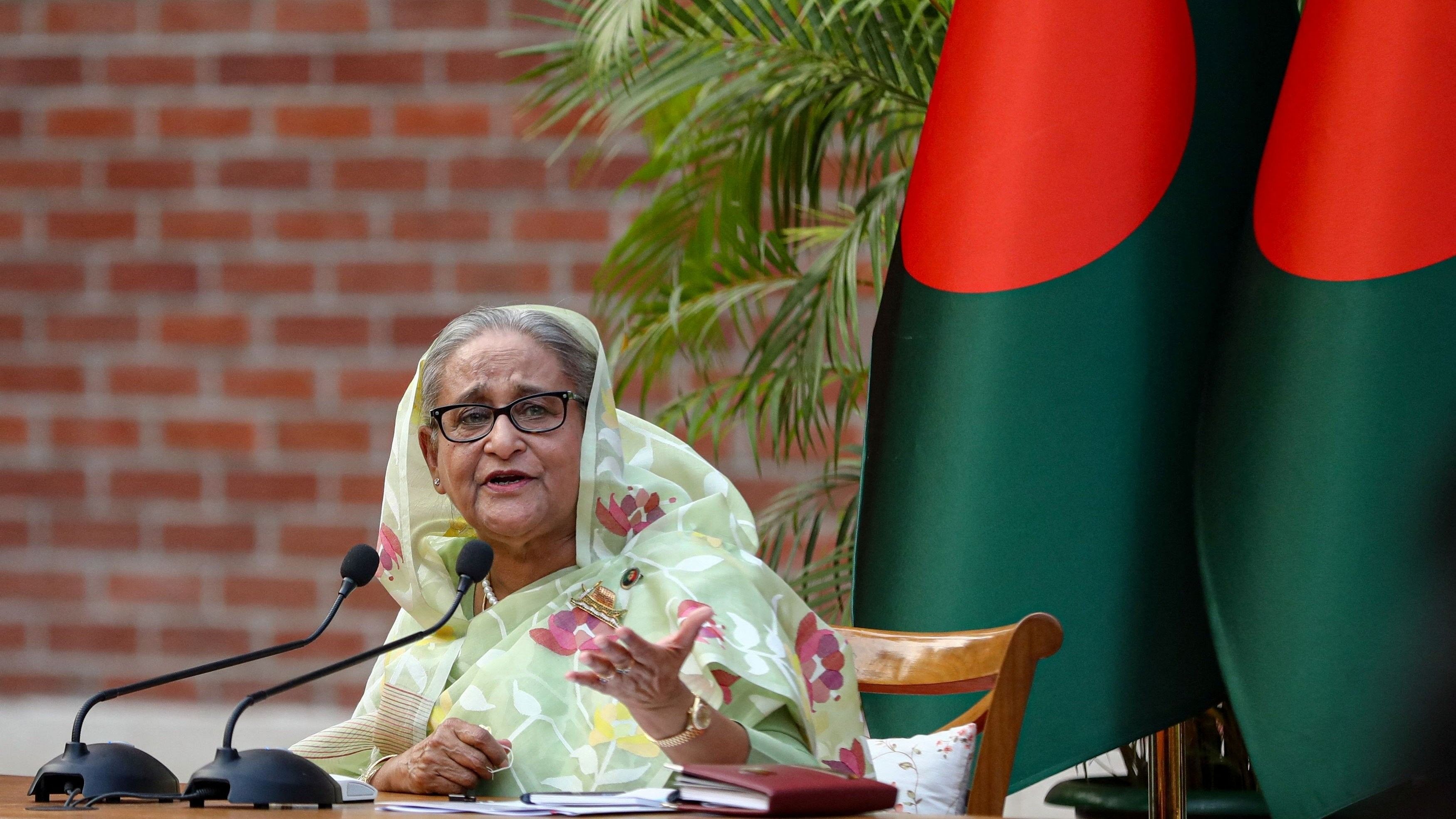
Sheikh Hasina.
Credit: Reuters Photo
Sheikh Hasina is model refugee. She is also well-trained as a refugee, having lived the life of one for six years in a house on New Delhi’s Pandara Road. It is one of the most secure areas in the national capital. Bharatiya Janata Party (BJP) leader L K Advani occupied a flat there for several decades until he became deputy prime minister.
Pranab Mukherjee has recounted to this author and many confidantes that he was her guardian, a father figure for Hasina, after almost all of her family was assassinated in 1975. In his memoir, the late president acknowledged that Hasina accompanied his children even on exclusive family picnics. Mukherjee trained Hasina, then only 28, to be a survivor and prepared her for politics in Bangladesh on the instructions of Indira Gandhi.
To avoid extradition to her motherland now, as demanded by her successor regime in Dhaka, Hasina needs to brush up all the lessons that she learned from Indira Gandhi, an indefatigable fighter, and Mukherjee, a wily and hugely successful all-weather survivor. That is why the deposed prime minister of Bangladesh has been more of a model refugee since August than, say, the 14th Dalai Lama, who occasionally violates the conditions of his exile. He is after all believed to be a reincarnation, therefore revered, and his advanced age of 89 allows him to take such liberties. Unlike the new dispensation in Dhaka, the government in Beijing does not really go beyond verbal disapprobation, and is not trying to get its hands on Tenzin Gyatso.
Another reason why Hasina will give no further cause for her deportation is that her only daughter, Saima Wazed – commonly known by the name Putul – lives in New Delhi. Earlier this year, she took charge as South East Asia Regional Director of the World Health Organization (WHO) on a five-year appointment. The WHO’s South East Asia Regional Office is located in New Delhi. For Hasina, Saima is one of only three surviving close blood relatives.
The deposed prime minister is widely expected to pass the Awami League baton to her only son, Sajeeb Wazed: the Indian government will expect Hasina to not engage in political activities while she is a refugee in New Delhi. This is a condition imposed on most foreign public figures, who live in exile in India, to retain a modicum of cordiality with their native countries.
Traditionally, India has been a magnet for dissident politicians, persecuted writers, and intellectuals who suffocate under tyranny in their own countries. This is a natural consequence of having been one of only two true democracies in South Asia, the second being Sri Lanka. For countless years under an autocratic king and his ‘panchayat’ system of government, which he passed off as democracy, leaders of political parties, especially the Nepali Congress, lived in exile in India. But monarchs in Kathmandu’s Narayanhiti Palace did not ask India for their extradition. During the 30 years when Maumoon Abdul Gayoom was President of the Maldives, opposition politicians who fought for a more open political system sought refuge in India.
Sri Lanka, despite being a democracy has a chequered history of violence and a long civil war. Its Tamil leaders and thousands of their followers were refugees in India for long periods. With the support of alternating state governments in Tamil Nadu, they imported their fights from home into South India, even assassinating Rajiv Gandhi, who may have returned as prime minister if the 1991 elections ran their course.
Pakistani leaders fleeing army rule, understandably, never lived in exile in India, preferring London, Riyadh, or Dubai. But that did not prevent India from covertly playing favourites among them. Afghanistan is another country whose successive leaders fled to India for their lives with frequent regime changes in Kabul. Even Lhotshampa, Nepali settlers in Bhutan since the 19th century, and some of their leaders had moved to India after being displaced as foreigners.
Extradition is a relatively new tool in neighbourhood diplomacy in South Asia. India and Afghanistan signed an extradition treaty only in 2016. With Bangladesh, India signed such a treaty in 2013, and with Bhutan only in 1996. Its oldest extradition treaty in the neighbourhood is with Nepal, in 1956, but the instrument has rarely been used in a political context.
New Delhi and Colombo only have an extradition ‘arrangement’, which means nationals of each other can be sought for limited crimes such as trafficking in narcotics, for example. There are no provisions for extradition to or from Pakistan or the Maldives.
Until recently, most South Asian nations chafed, but tacitly accepted that as a regional superpower, India will have a role in domestic politics in their countries. Dhaka’s demand for extraditing Sheikh Hasina, therefore, sets a new precedent in South Asia’s statutory diplomatic framework.
(K P Nayar has extensively covered West Asia and reported from Washington as a foreign correspondent for 15 years.)
Disclaimer: The views expressed above are the author's own. They do not necessarily reflect the views of DH.